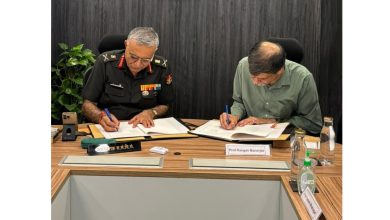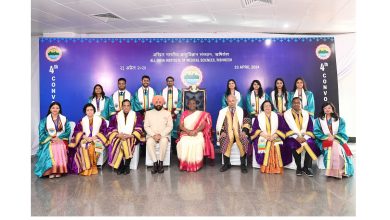JDRF International with William J Clinton Foundation to improve Type 1 diabetes care in India

The efforts include supporting public health programmes, innovative grassroots initiatives, and dedicated clinician networks converging to create a multi-dimensional strategy to tackle T1D
JDRF International, the leading global type 1 diabetes (T1D) research and advocacy organisation, in partnership with the community, clinical partners and William J Clinton Foundation (WJCF), an affiliate of the Clinton Health Access Initiative in India, announced a sweeping set of collaborations that aims to drastically improve T1D care.
The efforts include supporting public health programmes, innovative grassroots initiatives, and dedicated clinician networks converging to create a multi-dimensional strategy to tackle T1D. This approach reflects a holistic understanding of health care. Ensuring that essential social and educational needs are met, as all partners work in concert to promote more effective diabetes management for people living with T1D in India.
“We are incredibly humbled to have the opportunity to work closely with our Indian colleagues who are making great strides in removing barriers to access and improving outcomes around the country,” said Sanjoy Dutta, Chief Scientific Officer, JDRF. “Increasing care for people living with type 1 diabetes in India is vital to JDRF’s global access work.”
According to the T1D Index, a first-of-its-kind data simulation tool that measures the human and public health impact of type 1 diabetes, India has the largest ‘missing’ prevalence of type 1 diabetes in the world. Increasing focus on screening for diagnosing T1D and helping manage care will improve longevity and quality of life for them.
As part of this process, the Government of India has initiated several comprehensive programs that address immediate health care needs and pave the way for long-term systemic improvements in T1D care. Several Indian states are at the forefront, with significant T1D programmes, serving as models of innovation and effectiveness and select states will be served by the support currently being developed in partnership with JDRF International, William J Clinton Foundation, The Helmsley Charitable Trust with support from Eli Lilly and Company.
“At William J Clinton Foundation, we are deeply committed to partnering with and supporting public health programmes for comprehensive management of type 1 diabetes in select states of India. Our approach is that of collaboration and facilitation and our partnership with JDRF is designed to complement and enhance government-led diabetes care programs,” said Harkesh Dabas, Managing Director, William J Clinton Foundation. “We aim to bolster the implementation and scaling of these important initiatives. Our involvement underscores a public healthcare-owned and led initiative and collaborative spirit, ensuring that the strides made in type 1 diabetes care are both impactful and sustainable, and reach every individual in need across the country.”
These dramatic advances in diabetes care are supported by The Impatient Network, a dynamic coalition of grassroots and community-based diabetes advocates working across India. Made up of people living with diabetes and their loved ones, The Impatient Network is working with partner organisations to provide access to peer-led education, support services and resources that will help to combat stigma and raise T1D awareness.
“As someone who personally navigates the challenges of type 1 diabetes, I’ve seen firsthand the critical need for comprehensive support and care. My involvement with The Impatient Network, starting from its first meeting, has been a journey of hope”, said Princess Padmaja Kumari Parmar, Founder and President of Friends of Mewar. “This network is a vital link in the collaboration between people with diabetes, government bodies, and clinicians. By joining hands with policymakers and medical experts, we are not just voicing our needs; we’re actively shaping a future where diabetes care is inclusive, innovative, and accessible to all. This collaborative approach is key to ensuring that every person with type 1 diabetes in India has access to the best possible care and support.”
“The Impatient Network stands as a beacon of hope and change in India’s type 1 diabetes landscape. As a united force of grassroots advocates, we embody the collective voice and determination of communities striving for better diabetes care,” said Jazz Sethi, global diabetes advocate, Impatient Network member, and founder of The Diabesties Foundation. “Our focus on peer-led education and innovative awareness initiatives is more than just filling gaps in health care; it is about building trust, understanding, and a sustainable framework for comprehensive diabetes management. We’re crafting a future where type 1 diabetes care is accessible, empathetic, and effectively meets the real needs of those it serves.”
The initiative aims to create a synergy between medical experts and peer groups, fostering a cooperative environment where clinical knowledge meets community wisdom. This work is essential in making diabetes care more accessible and tailored to the needs of people living with T1D in India.
“In our mission to advance T1D care in India, collaboration is key. A key part of that is a partnership with the existing work being done by clinical communities such as the Diabesties & Blue Circle and institutions such as RSSDI, ISPAE, and ESI,” said Professor Partha Kar, NHS National Specialty Advisor in Diabetes. “Our Clinical Stewardship Program embodies this collaborative ethos, bridging the gap between medical professionals and the T1D communities we serve. It is a personal privilege to be given this opportunity by JDRF – to be able to give back something to the country to which I owe so much of my life. As the saying goes: ‘Phir Bhi Dil Hai Hindustani’ (still my heart is Indian).”




